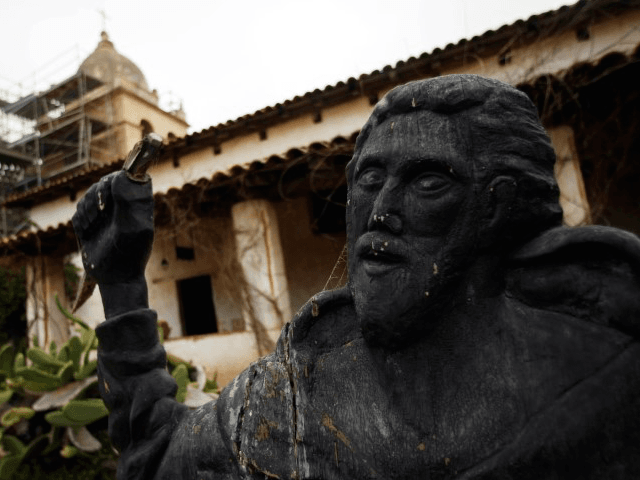California Governor Jerry Brown will take his utopian foreign policy to the Vatican to participate this week in an environmental summit hosted by Pope Francis. Despite California’s majority Democrats’ intention to banish celebrations of Catholic missionary Father Junipero Serra’s accomplishments, Brown will carry a state resolution supporting Pope Francis’ recent draft “Encyclical on Climate Change.”
Pope Francis last month called for a new global political authority tasked with “tackling…the reduction of pollution and the development of poor countries and regions.” Governor Brown has proposed that other countries join California in requiring an increase in the generation of electricity from renewable sources, boost energy efficiency in older buildings, and reduce by half the amount of gasoline used on state roads.
In addition, Pope Francis has stated that Father Junipero Serra, the Spanish Franciscan friar who founded the first nine Spanish missions in California from San Diego to San Francisco, is “one of the founding fathers of the United States, a saintly example of the Church’s universality, and special patron of the Hispanic people of the country.” The Pope is preparing to canonize Father Serra on September 23 during his visit to Washington, D.C.
But on June 25, the California Senate passed Joint Resolution 4 by a 22-10 vote in favor of banishing the statue of Father Serra that has on display in U.S. Capitol’s Statuary Hall since 1931. State Senator Ricardo Lara, an openly gay Los Angeles Democrat, wants to replace Serra with a monument honoring astronaut Sally Ride as “the first member of the LGBT community” to be honored in Statuary Hall.
Brown is one of about 50 public officials from around the world who were invited to the Vatican conference to discuss climate change and modern slavery. Governor Brown is set to address the general summit meeting on Tuesday and Wednesday.
The Governor has set an interim goal of requiring the state to cut carbon emissions to 40 percent below 1990 levels by 2030. Brown has made a slew of highly promoted international trips to urge China, Mexico and others to commit to stopping global warming. Brown’s latest proposed legislation would require utilities to obtain half of their electricity from renewable sources such as solar and wind by 2030, up from a mandate of one-third by 2020.
Although the centerpiece of Brown’s climate change initiative has been adopting a trading system referred to as “cap-and-trade,” Pope Francis in a specific and absolutely unambiguous passage in the draft Papal Encyclical rejected all forms of “carbon credits” as a solution to the problem.
The Pope has his college degree in chemistry and is sensitive to how crony capitalism has hijacked the environmental movement. He stated in his draft encyclical that a cap-and-trade a system “could give rise to a new form of speculation and would not help to reduce the overall emission of polluting gases.” Pope Francis worries that selling the right to pollute would “support the super-consumption of certain countries and sectors,”
Many analysts have dismissed Governor Brown’s proposals as unrealistic. An analysis from San Francisco-based environmental consulting firm E3 estimated that California would need up to 8 million zero-emission vehicles on the road by 2030 to help slash carbon pollution to the levels demanded by Brown. With only 142,000 “zero emissions vehicles” on the road, 570,000 electric vehicles would need to be sold in California each year.
According to an April analysis co-managed by E3 and Lawrence Berkeley National Laboratory, it is more likely that California will need to grow its imports of clean electricity from other states and Canadian provinces to achieve its renewable fuel goals.

COMMENTS
Please let us know if you're having issues with commenting.